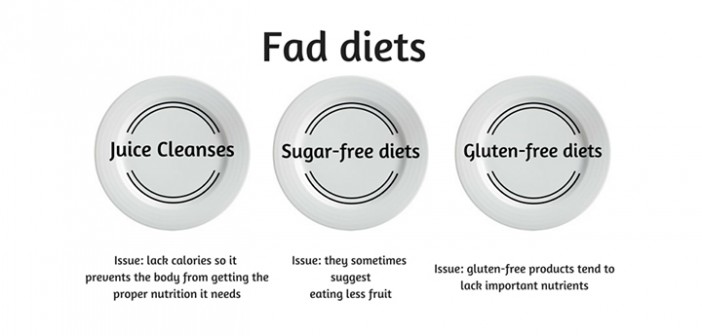Fad diets are trendy, promising quick, noticeable results with virtually no exercise required. But the dangers they pose almost always outweigh the benefits of the short-lived results, robbing the body of necessary nutrients, according to Carrie Gerencher, the registered dietician at Lehigh.
The common misconceptions and health risks posed by these diets were discussed at the Health Center on Thursday as part of the center’s monthly “Nutrition Talks.”
Gerencher said fad diets are popular because of the instant benefits they bring, which are almost always temporary.
“Fad diets promise a lot of things but then don’t actually deliver,” Gerencher said. “They work for a couple weeks, but then you gain most of the weight back.”
Gerencher then gave students tips on how to spot fad diets, encouraging them to watch out for diets that promise to cause an unrealistic amount of weight loss in a short period of time or claim that exercise isn’t necessary.
Gerencher mentioned fad diets that are trending today, such as the gluten-free or sugar-free diets. While she strongly encouraged staying away from processed sugar, Gerencher said one issue with sugar-free diets is that they sometimes suggest eating less fruit, which isn’t healthy either because the restriction prevents people from getting the necessary amount of natural sugar.
“The media these days likes to talk about how sugar is the root cause of diabetes,” Gerencher said. “But it’s more important to focus on eliminating the wrong kinds of sugar, as opposed to sugar altogether.”
Juice cleanses were another form of weight loss that Gerencher spoke against, explaining that diets that claim to “detox” are harmful to the body because they lack calories and prevent the body from getting the proper nutrition it needs. Having tried a cleanse, Gerencher said she felt malnourished during the process and was extremely tired all the time.
“I had no energy,” Gerencher said. “I couldn’t exercise because I was so exhausted. And not exercising isn’t healthy either.”
The vegan diet was also discussed and some students posed concerns about following such a strict diet while depending on college dining halls.
Collier Sutter, ’17, talked about her experience with the diet and said she hadn’t felt much different during the three-day challenge. All she noticed, she said, was how hard it was to actually stick to the diet.
“It was really hard to manage because I had to eat at the dining halls everyday,” Sutter said. “Sometimes my only option was salad and that’s not really filling enough.”
The dining hall complaints quickly turned to a discussion on how to eat properly. Gerencher heavily stressed the importance of portion control and moderation, and discouraged watching TV or surfing the web during meals because it may be a distraction that causes overeating. Gerencher also emphasized the importance of exercising, suggesting 30 to 60 minutes of physical activity daily. Another tip Gerencher gave students was to be wary of food labels that claim to have less fat. The added ingredients are often worse than the fat, she said.
“If they reduce the amount of fat, you have to wonder where the flavor goes,” Gerencher warned. “They have to replace it by adding sugar.”
Gerencher provided students with resources to help them establish healthier eating habits, such as websites like choosemyplate.gov. She suggested following the “rainbow” guidelines, which means eating foods from all different food groups. Gerencher also shared her own recipes for homemade snacks, like apple chips or trail mix, which she said can be made by mixing nuts, whole grains, dried fruit and whole grain cereal.
Gerencher then turned the discussion to the students, asking them to share their own motivations for staying healthy.
“It’s because of longevity,” Jade Radigan, ’16, said. “People always ask me why I eat so healthily all the time if I’m already skinny. But you have to take into consideration the long-term effects, too.”
Radigan also said that people need to realize that eating right isn’t just necessary in terms of looks– it’s important to eat right for the sole purpose of being healthy.
Sutter said being healthy is a necessary component for a good body image, saying the unrealistic expectations people face would disappear if people aimed for good health instead of perfection.
“Everybody is always so concerned with their body image,” Sutter said. “But there is no need to compulsively obsess with how you look if you just eat right.”
Focusing on a proper diet and sufficient exercise will make people feel better about themselves, which will solve the problem of insecurity when it comes to body image, Sutter said.
“It doesn’t matter if you live up to the ridiculous standards. Just focus on trying to improve yourself on the inside,” Sutter said. “That’s all that matters.”
The next Nutrition Talks, which will focus on healthy food swaps, will take place on Feb. 12 at 4:15 p.m. in the Health Center.






Comment policy
Comments posted to The Brown and White website are reviewed by a moderator before being approved. Incendiary speech or harassing language, including comments targeted at individuals, may be deemed unacceptable and not published. Spam and other soliciting will also be declined.
The Brown and White also reserves the right to not publish entirely anonymous comments.